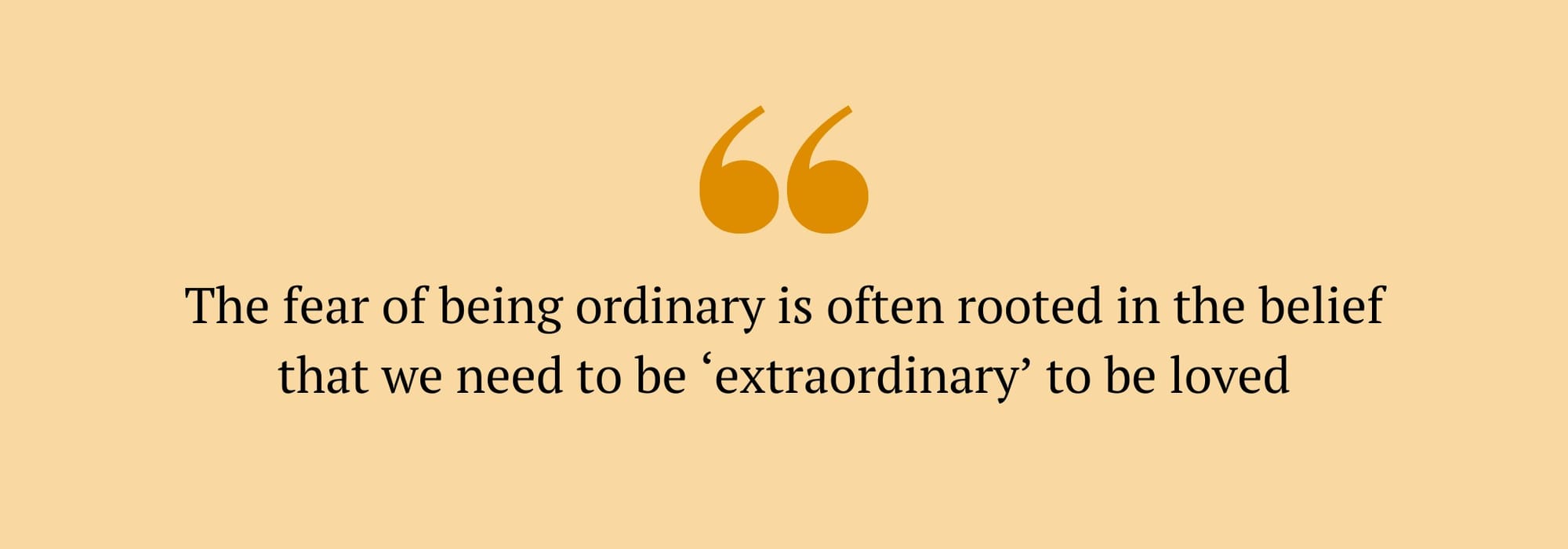Koinophobia: We explore the fear of being 'ordinary' and how to overcome it
updated on Feb 29, 2024

Do you fear ‘being normal’?
Have you ever worried that your life is a little… mediocre? To combat it, perhaps you’ve shunned somewhat conventional ways of living, all in the name of being ‘extraordinary’. Maybe you’ve pursued professional accomplishments with an insatiable hunger, dreamed of becoming a successful influencer with brand collaborations to boot, or travelled all over the world in the name of creating unforgettable experiences.
You can’t stand the thought of being average but, somehow, no matter how much you experience and accomplish, it never seems like enough. If this sounds familiar, you may have a touch of ‘koinophobia’: the fear of being ordinary.
This phobia has its plus points. It can motivate you to achieve incredible things, but left unchecked it can wreak havoc on your mental health. So, where does this fear come from and, when it threatens to disrupt your peace, how can you get it under control?
Saying no to normal
“The fear of being ordinary is often rooted in the belief that we need to be ‘extraordinary’ to be loved and accepted by others,” says psychotherapist Rachel Vora. “Low self-esteem and beliefs about ‘not being good enough’ can often be at the root of fearing an ‘ordinary’ life, as people often feel they need to prove themselves by achieving the ‘extraordinary’,” she says.
Social media has undeniably exacerbated the problem. These days we can check in with anyone, from our favourite influencer to our high school friends, to see how they’re doing in life – and with high-flying careers and picture-perfect holidays constantly presented as the norm, we can put pressure on ourselves to achieve more of the same.

“Social media can often make an ordinary life seem dull and boring, but can equally glamourise entrepreneurship and experiences to create the sense that our lives are not good enough as they are,” Rachel points out. “The constant barrage of images showing people living and experiencing extraordinary things suggests that we need these experiences to achieve happiness.”
And so we fall into the koinophobia trap: constantly racing towards the next big thing, believing that we must do extraordinary things to have a life well-lived. But koinophobia might prompt you to book that plane ticket or go after your dreams. So, what’s the harm?
Well, one of the big problems with koinophobia is that it can prevent you from doing things that could actually make you happy. Stuff you might actually want, for example, settling down in your home town or switching your high-octane career for a run-of-the-mill job that comfortably pays the bills.
It also creates a whole lot of stress and pressure that can be a detriment to your mental health. Look at burnout for example. According to a Gallup Poll, around 67% of us have experienced burnout – and the pressure placed on us to excel in all areas has certainly contributed to that. But koinophobia doesn’t only compound stress and instil unrealistic expectations. It challenges our self-worth.
“The fear of being ordinary can often encourage feelings of low self-worth as we believe we are not fulfilling our potential by living an ‘ordinary life’,” says Rachel. “What’s more, placing high expectations on ourselves to achieve the extraordinary leaves us with no room to make mistakes, and we are less likely to be self-compassionate when we experience hardships in life.”
It’s OK to be average
So, if the fear of being ordinary has infringed on your mental health, how can you live a more joyful, meaningful, and peaceful life – and learn to embrace the average and the mundane?
Rachel believes it starts with internal validation. So often, we act to impress others, but when you remove external validation from the equation, you can decide what it is you really want from life.
“When we place more value on the internal, we are less likely to attach our self-worth to external achievements,” Rachel points out. Focusing on internal validation means appreciating your innate value, and recognising how you make the world a better place, simply by being you.
It’s at this point that getting to know yourself and understanding what you actually want from life is key. “Being an entrepreneur or travelling the world would not make everyone happy,” Rachel notes. “So it’s important to separate expectations on social media from your sense of self, and know what would truly make you happy.”

Ultimately, Rachel says, it’s important to remember that being extraordinary will not increase your feelings of self-worth. You might assume that once you’ve reached a certain level of success you’ll finally feel like you have value. But that’s not the case and, Rachel says, once we truly accept this, we are more likely to look for the value in an ordinary life. If you’re having a hard time feeling worthy, embracing imperfection can do the trick.
It would be easy to assume that living this new lifestyle means having no goals or aspirations at all. Psychologist Jason O’Callaghan says that simply isn’t the case. He reckons it’s important to have something to aim for, or look forward to. It gives you a purpose.
Maybe it’s completing your local parkrun every Saturday, or planning a trip with friends. Perhaps it’s being more present in the moment, and remembering to enjoy the little things, whether it’s a cup of coffee in the morning or reading an engrossing novel before bed.
While seeking out the extraordinary, we can forget the value of the mundane. But remember this: on a clear, cloudless night, you don’t have to climb the highest peak to be able to see the stars.

